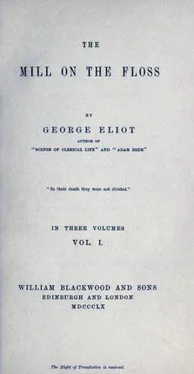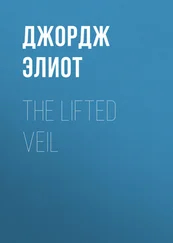And Maggie was so oppressed by this dreadful destiny that she had no spirit for a retort.
But when this small apparatus of shallow quickness was fetched away in the gig by Luke, and the study was once more quite lonely for Tom, he missed her grievously. He had really been brighter, and had got through his lessons better, since she had been there; and she had asked Mr. Stelling so many questions about the Roman Empire, and whether there really ever was a man who said, in Latin, "I would not buy it for a farthing or a rotten nut," or whether that had only been turned into Latin, that Tom had actually come to a dim understanding of the fact that there had once been people upon the earth who were so fortunate as to know Latin without learning it through the medium of the Eton Grammar. This luminous idea was a great addition to his historical acquirements during this half-year, which were otherwise confined to an epitomized history of the Jews.
But the dreary half-year did come to an end. How glad Tom was to see the last yellow leaves fluttering before the cold wind! The dark afternoons and the first December snow seemed to him far livelier than the August sunshine; and that he might make himself the surer about the flight of the days that were carrying him homeward, he stuck twenty-one sticks deep in a corner of the garden, when he was three weeks from the holidays, and pulled one up every day with a great wrench, throwing it to a distance with a vigor of will which would have carried it to limbo, if it had been in the nature of sticks to travel so far.
But it was worth purchasing, even at the heavy price of the Latin Grammar, the happiness of seeing the bright light in the parlor at home, as the gig passed noiselessly over the snow-covered bridge; the happiness of passing from the cold air to the warmth and the kisses and the smiles of that familiar hearth, where the pattern of the rug and the grate and the fire-irons were "first ideas" that it was no more possible to criticise than the solidity and extension of matter. There is no sense of ease like the ease we felt in those scenes where we were born, where objects became dear to us before we had known the labor of choice, and where the outer world seemed only an extension of our own personality; we accepted and loved it as we accepted our own sense of existence and our own limbs. Very commonplace, even ugly, that furniture of our early home might look if it were put up to auction; an improved taste in upholstery scorns it; and is not the striving after something better and better in our surroundings the grand characteristic that distinguishes man from the brute, or, to satisfy a scrupulous accuracy of definition, that distinguishes the British man from the foreign brute? But heaven knows where that striving might lead us, if our affections had not a trick of twining round those old inferior things; if the loves and sanctities of our life had no deep immovable roots in memory. One's delight in an elderberry bush overhanging the confused leafage of a hedgerow bank, as a more gladdening sight than the finest cistus or fuchsia spreading itself on the softest undulating turf, is an entirely unjustifiable preference to a nursery-gardener, or to any of those regulated minds who are free from the weakness of any attachment that does not rest on a demonstrable superiority of qualities. And there is no better reason for preferring this elderberry bush than that it stirs an early memory; that it is no novelty in my life, speaking to me merely through my present sensibilities to form and color, but the long companion of my existence, that wove itself into my joys when joys were vivid.
Chapter II. The Christmas Holidays
Fine old Christmas, with the snowy hair and ruddy face, had done his duty that year in the noblest fashion, and had set off his rich gifts of warmth and color with all the heightening contrast of frost and snow.
Snow lay on the croft and river-bank in undulations softer than the limbs of infancy; it lay with the neatliest finished border on every sloping roof, making the dark-red gables stand out with a new depth of color; it weighed heavily on the laurels and fir-trees, till it fell from them with a shuddering sound; it clothed the rough turnip-field with whiteness, and made the sheep look like dark blotches; the gates were all blocked up with the sloping drifts, and here and there a disregarded four-footed beast stood as if petrified "in unrecumbent sadness"; there was no gleam, no shadow, for the heavens, too, were one still, pale cloud; no sound or motion in anything but the dark river that flowed and moaned like an unresting sorrow. But old Christmas smiled as he laid this cruel-seeming spell on the outdoor world, for he meant to light up home with new brightness, to deepen all the richness of indoor color, and give a keener edge of delight to the warm fragrance of food; he meant to prepare a sweet imprisonment that would strengthen the primitive fellowship of kindred, and make the sunshine of familiar human faces as welcome as the hidden day-star. His kindness fell but hardly on the homeless, — fell but hardly on the homes where the hearth was not very warm, and where the food had little fragrance; where the human faces had had no sunshine in them, but rather the leaden, blank-eyed gaze of unexpectant want. But the fine old season meant well; and if he has not learned the secret how to bless men impartially, it is because his father Time, with ever-unrelenting unrelenting purpose, still hides that secret in his own mighty, slow-beating heart.
And yet this Christmas day, in spite of Tom's fresh delight in home, was not, he thought, somehow or other, quite so happy as it had always been before. The red berries were just as abundant on the holly, and he and Maggie had dressed all the windows and mantlepieces and picture-frames on Christmas eve with as much taste as ever, wedding the thick-set scarlet clusters with branches of the black-berried ivy. There had been singing under the windows after midnight, — supernatural singing, Maggie always felt, in spite of Tom's contemptuous insistence that the singers were old Patch, the parish clerk, and the rest of the church choir; she trembled with awe when their carolling broke in upon her dreams, and the image of men in fustian clothes was always thrust away by the vision of angels resting on the parted cloud. The midnight chant had helped as usual to lift the morning above the level of common days; and then there were the smell of hot toast and ale from the kitchen, at the breakfast hour; the favorite anthem, the green boughs, and the short sermon gave the appropriate festal character to the church-going; and aunt and uncle Moss, with all their seven children, were looking like so many reflectors of the bright parlor-fire, when the church-goers came back, stamping the snow from their feet. The plum-pudding was of the same handsome roundness as ever, and came in with the symbolic blue flames around it, as if it had been heroically snatched from the nether fires, into which it had been thrown by dyspeptic Puritans; the dessert was as splendid as ever, with its golden oranges, brown nuts, and the crystalline light and dark of apple-jelly and damson cheese; in all these things Christmas was as it had always been since Tom could remember; it was only distinguished, it by anything, by superior sliding and snowballs.
Christmas was cheery, but not so Mr. Tulliver. He was irate and defiant; and Tom, though he espoused his father's quarrels and shared his father's sense of injury, was not without some of the feeling that oppressed Maggie when Mr. Tulliver got louder and more angry in narration and assertion with the increased leisure of dessert. The attention that Tom might have concentrated on his nuts and wine was distracted by a sense that there were rascally enemies in the world, and that the business of grown-up life could hardly be conducted without a good deal of quarrelling. Now, Tom was not fond of quarrelling, unless it could soon be put an end to by a fair stand-up fight with an adversary whom he had every chance of thrashing; and his father's irritable talk made him uncomfortable, though he never accounted to himself for the feeling, or conceived the notion that his father was faulty in this respect.
Читать дальше












